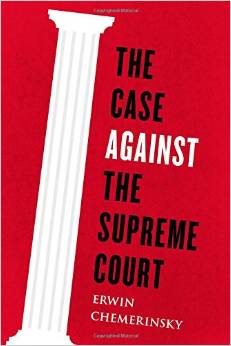September 17, 2014
Private: How the Supreme Court is Failing the Constitution
2014 Constitution Day symposium, Ewrin Chemerinsky, The Case Against the Supreme Court

by Erwin Chemerinsky, Dean and Distinguished Professor of Law, Raymond Pryke Professor of First Amendment Law, University of California, Irvine School of Law. This post is part of our 2014 Constitution Day symposium.
Constitution Day, Wednesday, September 17, is a national day to celebrate the Constitution, but it also should be an occasion for critically appraising it and the government that it created. On September 17, 1787, the drafters of the Constitution signed the document and it was then submitted to the states for ratification. There is much to celebrate about the Constitution.
For 227 years, there has been democratic rule. The Constitution is a document that had enough certainty to create a working government and enough flexibility that although written for an agrarian slave society, it still can be used for the technological world of the early 21st century. It is a document that both creates power and provides checks on that authority. It protects basic values like separation of powers and freedom and liberty and due process of law.
Yet any celebration of the Constitution needs to be tempered by recognition of its failures too. For the first 78 years of its existence, the Constitution explicitly protected the rights of slave owners. For 58 years, it was interpreted to approve Jim Crow laws that segregated every aspect of Southern life. The results are the enormous racial inequalities that exist today. According to the 2010 census, 27.22 percent of African-Americans live below the poverty level, compared with only 9.7 percent of whites. Thirty-five percent of all African-American children are in families below the poverty line.
In a book to be published by Viking this month, The Case Against the Supreme Court, I argue that the Supreme Court deserves a good deal of the blame for the failure to deal with racial inequality throughout American history and today. In fact, my thesis is that the Supreme Court has largely failed throughout American history, especially at its most important tasks and at the most important times.
The Supreme Court exists, above all, to enforce the Constitution against the will of the majority. The Court plays an especially important role in safeguarding the rights minorities of all types who should not have to rely on democratic majorities for protection. The Court also should be crucial in times of crisis in ensuring that the passions of the moment do not cause basic values to be compromised or lost.
But the Court has had a dismal record of protecting minorities and has continually failed to stand up to majoritarian pressures in times of crisis. During World War I, individuals were imprisoned for speech that criticized the draft and the war without the slightest evidence that it had any adverse effect on military recruitment or the war effort. During World War II, 110,000 Japanese-Americans were uprooted from their life long homes and placed in what President Franklin Roosevelt referred to as concentration camps. During the McCarthy era, people were imprisoned simply for teaching works by Marx and Engels and Lenin. In all of these instances, the Court erred badly and failed to enforce the Constitution.
Nor are the failures just a thing of the past. The Roberts Court has furthered racial inequality by striking down efforts by school boards to desegregate schools and by declaring unconstitutional crucial provisions of a landmark civil rights statute, the Voting Rights Act of 1965. The Roberts Court has continually favored the rights of business over the rights of employees and consumers and all of us. It has made it much more difficult for those whose rights have been violated to have recourse through the courts by creating significant barriers to suits against governments and government officers. It has tremendously expanded the rights of corporations in the political process, such as by holding that they have a right to spend unlimited sums of money in election campaigns, while simultaneously limiting the rights of unions.
I, of course, am not saying that every Supreme Court decision is misguided or even that the majority of them are wrong. That would be a silly claim. But I do contend that the Court has often tragically failed, especially when it was most needed to enforce the Constitution.
My conclusion is not to give up on the Supreme Court and it certainly is not to give up on the Constitution. But I believe that there are many reforms that can make the Court better and taken together make it less likely that it will so badly fail in the future. I propose a host of changes, including instituting merit selection of Supreme Court justices, creating a more meaningful confirmation process, establishing term limits for Supreme Court justices, changing the Court’s communications (such as by televising its proceedings), and applying ethics rules to the justices.
I am a huge fan of the Constitution and the American democracy it created. But 35 years of teaching and writing and litigating about the Constitution have convinced me that I, and others, too often make excuses for the Court. We can and must expect it to do better in enforcing the Constitution in the years, decades and perhaps centuries to come.
Constitutional Interpretation, Racial Justice, Supreme Court




